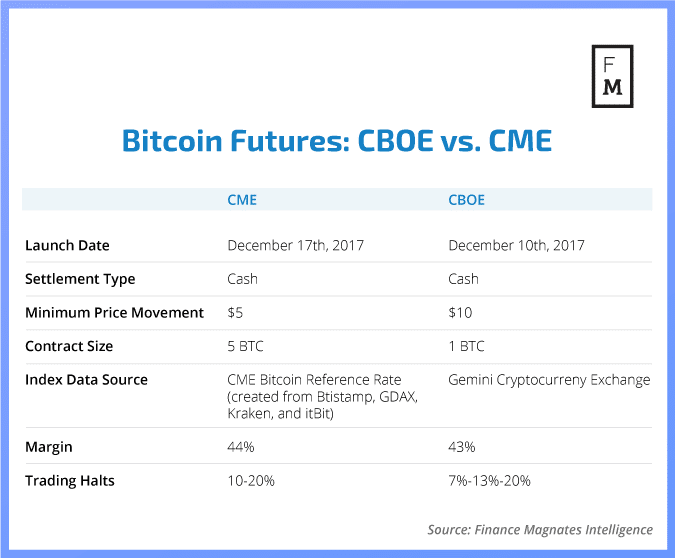When the creation of Bitcoin futures contracts was first announced on Cboe and CME, American economists and investors were taken aback.
After all, futures contracts have long been regarded as inherently riskier than other types of investments due to the fact that they involve leverage trading. According to some, the volatility in the price of Bitcoin pushed the risk factor over the edge.
Thomas Peterffy, Chairman of trading platform Interactive Brokers, even went so far as to have a full-page letter to Commodity Futures and Trading Commission Chairman Christopher Giancarlo published in the Wall Street Journal. In the letter, he warned that the trading of Bitcoin futures contracts could “destabilize” the entire economy.
“Cryptocurrencies do not have a mature, regulated and tested underlying market,” he wrote. “The products and their markets have existed for fewer than 10 years and bear little if any relationship to any economic circumstance or reality in the world.”
But Peterffy’s attempts to raise the alarm bells around the trading of Bitcoin futures contracts were in vain. Both Cboe and CME went ahead with the launch of the contracts.

Cboe announced that it would be closing its Bitcoin futures markets on March 15, 2019. The last contract expired on June 19, 2019.
At the time that the contracts were launched, Chris Concannon, the then-President and Chief Operating Officer of Cboe Global Markets, predicted that the derivatives would be revolutionary for the traditional sphere of finance, and would significantly boost cryptocurrency acceptance:
“Over the next 10 years we believe that the cryptocurrency market will explode in terms of the assets that they touch, the currencies that they involve,” he said.
Not so fast...
But for all of their gusto, neither Peterffy nor Concannon were quite correct in their predictions.
While the launch of these contracts may have contributed to the speculative bubble that drove Bitcoin and other cryptocurrencies to new heights at the end of 2017, the economy as a whole was more or less unaffected--and certainly was never “destabilized.”
Ironically, Bitcoin futures and other kinds of crypto-based futures contracts even became the product-of-choice for many institutional investors, who saw crypto futures contracts as less risky than trading directly in crypto assets.
And while interest in Bitcoin futures contracts did continue to grow, Cboe’s Bitcoin futures never seemed to catch on in the way the exchange was hoping they would.
So when Cboe announced in mid-March that it would be ending its Bitcoin futures offerings after the closure of its last open contract, it wasn’t because they had proven to be too risky, as analysts like Peterffy may have believed would eventually be the case.
Instead, the decision seemed to be motivated by a lack of interest in the product, although the exchange said that it was open to the possibility of re-opening its BTC futures offerings one day in the future.
“CFE is not adding a Cboe Bitcoin (USD) (“XBT”) futures contract for trading in March 2019,” the exchange announced in March. “CFE is assessing its approach with respect to how it plans to continue to offer digital asset derivatives for trading. While it considers its next steps, CFE does not currently intend to list additional XBT futures contracts for trading.”
What does this all mean?
At the time the announcement was made, it seemed to make sense--it was just the latest piece of bad news on an ever-lengthening list of signs that the Bitcoin markets were falling past the point of no return. Bitcoin was sitting around $4000, where it had been hovering for months; many analysts predicted that the doldrums would continue, or that conditions would worsen.
Ari Rastegar, CEO of Rastegar Property, told Finance Magnates that at the time, Cboe’s decision to close its Bitcoin futures markets could have reflected a lack of institutional interest in cryptocurrency markets.

Ari Rastegar.
“Bitcoin futures were created to attract institutional investors in the first place, and its two key components are hedging against volatility and bringing Liquidity to the marketplace. With that said, bitcoin futures no longer being traded on Cboe [signified] a lack of faith and a lack of interest from institutional investors.”
And this did seem to be the case. While Bitcoin futures markets on other platforms seemed to be faring fairly well, Cboe’s decision to close the offering seemed to signify a sort of turning point--the exchange, which had been the first US exchange to offer BTC futures contracts, decided that it had bigger fish to fry.
But shortly after Cboe’s decision was announced, it seemed as though the exchange might have jumped the gun.
Since Cboe’s Bitcoin futures markets closed, CME’s Bitcoin futures markets have skyrocketed
Roughly two and a half weeks after the markets were closed, the price of Bitcoin jumped from around $4100 to $4800. At first, it seemed as though the price increase was a “dead cat bounce”--a brief spike before a fall to a new low.
However, the price just kept climbing. By May 1, Bitcoin had hit roughly $5300; by June 1, the price had risen to nearly $8500.
And sure enough, the bullish energy in Bitcoin spot markets was reflected in Bitcoin futures markets. On April 4, CME reported a new record trading volume in its Bitcoin futures markets with 22,500 contracts (representing 112,700 BTC) settled in 24 hours; another new record was posted the next day on April 5. Previously, the 24-hour record had been 18,300 contracts on February 19.
Then, in May, the exchange reported a new daily record of 33,677 contracts on May 13th, and monthly record of 300,000 contracts settled.
Over April and May, #bitcoin notional trading volume at the @CMEGroup was larger than the volume for the previous 6 months combined. pic.twitter.com/WHUIqkof0u
— TradeBlock (@TradeBlock) June 6, 2019
On June 26th, CME’s Bitcoin futures market saw another new 24-hour record volume of $1.6 billion in notional trading volume.
CME Bitcoin futures reached a record $1.7B in notional value traded on June 26, surpassing the previous record by more than 30%. The surge in volume also set a new open interest record of 6,069 contracts as institutional interest continues to build. $BTC https://t.co/WqXSPX0raR pic.twitter.com/HjGKb9a0ah
— CMEGroup (@CMEGroup) June 28, 2019
Does the increase in futures contracts mean that institutional investors are bullish on crypto?
Of course, some of the trading volumes on CME can almost certainly be attributed to the migration of traders who may have traded exclusively on Cboe before the Bitcoin futures market shut down.
However, another portion of the trading volume can almost certainly be attributed to the upward price motion in Bitcoin spot markets.
But does the ever-climbing Bitcoin futures trading volume on CME mean that traders are bullish on the future price of Bitcoin itself?
Not necessarily--in fact, a report from the Commodity Futures Trading Commission said that traders took 14 percent more bearish ‘short’ positions in CME bitcoin futures last week than they did bullish ‘long’ positions.
However, the Wall Street Journal said that this doesn’t necessarily imply that traders are bearish on Bitcoin. “Such data don’t necessarily mean hedge funds are placing outright bets that bitcoin will drop,” reads a recent article from the publication. “The short bets could also be part of hedging strategies: for instance, a fund with a portfolio of bitcoins might go short at CME as insurance against the value of bitcoin dropping.”
Overall institutional interest in crypto is strong, according to Fidelity
But the WSJ did point out an interesting dichotomy between retail and institutional traders--according to the same article, traders with fewer than 25 BTC held long contracts held more long contracts than larger investors by a factor of four to one, which could be an indication that small investors are more bullish than large investors.
Whether or not this is true, there seems to be no shortage of institutional interest in the crypto markets. Fidelity Investments published a study at the beginning of May showing that not only was institutional engagement in crypto “here,” but also that “institutional investors are overwhelmingly favorable about the appealing characteristics of digital assets.”
Indeed, nearly 70 percent of respondents said that they found certain characteristics of digital assets “appealing.”
Forty-seven percent “appreciate[d] that digital assets are an innovative technology play,” and 46 percent found their low correlation to other assets appealing.
Additionally, 27 percent of the respondents like the high upside potential that digital assets have to offer, and 25 percent were a fan of the decentralized nature of most cryptocurrencies.
Additionally, Bitcoin futures trading in other markets has also continued to grow; BitMEX’ Bitcoin futures trading market reported yesterday that its trading volume had exceeded $1 trillion in the past 365 days.
Cboe still has “nothing new to announce”
Indeed, it seems that offering Bitcoin futures products has been an extremely profitable endeavor ever since Cboe decided to shut its Bitcoin futures market down.
However, it seems that although there has been a lot of good news in the cryptocurrency markets over the last several months, Cboe will need to see a bit more of it before it makes any drastic decisions. But if the exchange does reopen its BTC futures markets, well--that’s an institutional player whose re-entry would surely signify a lot of bullish sentiment for Bitcoin.






















